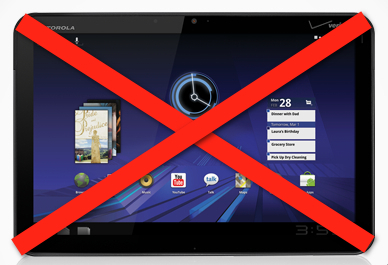The failing of Android as a tablet platform


Why would an Android enthusiast make that statement? Because the patchwork that is Android is not consistent enough to allow the platform to compete adequately with the competition. Google has set out to be loose in its control over Android as a platform, and that looseness is beginning to cost tablet makers millions, perhaps billions of dollars. The problem is there is no real Android for tablets, just a framework for OEMs to change at will to try and compete with their products. The problem is they are not competing with other platforms, they end up competing with other Android tablet makers and diluting the ability of the platform to make a run at Apple's iPad.
What has precipitated this rant? Yet another debacle of mind-blowing proportions. Earlier this year Motorola released the very first tablet running Honeycomb, the platform-defining tablet to take on the popular iPad. The XOOM had every feature that could be crammed into a thin form, including one that even the vaunted iPad lacks. Motorola put a microSD card slot in the XOOM so owners could greatly augment the system storage. The problem was this slot did not work on shipping units. That's right, a primary hardware feature on this "iPad killer" did not work at all. It just took up space, added weight (albeit not much) and added cost to the buyer.
Motorola quickly jumped in after the XOOM release and said support for this memory card slot would be coming soon. That didn't happen, even with the recent major upgrade to Android 3.1 that rolled out. XOOM owners were surprised to find the SD slot still didn't work after this big system update.
Months later comes word from Motorola in Europe that an update to enable this dead hardware will finally be rolling out for XOOM owners, but only outside the U. S. The SD card fix will be part of the Honeycomb 3.1 update for non-US XOOMs. No word when the U. S. models will get the fix, and no word from Motorola explaining why the 3.1 update in the U. S. didn't include the fix as will the non-US update.
So you're wondering why this bothers me, not even owning a XOOM? Because it is symptomatic of the problem with Android in general, that the platform is totally fragmented due to no one company taking ownership of it as a platform. Google certainly doesn't, and OEMs can't. The end result is that Android tablet makers end up not competing with the iPad, the logical target, but rather with each other. Each Android tablet comes to market with different hardware (most of which actually works), and software that is different from that which ships with Android proper.
Consumers have no chance to make sense of this, so there will never be a uniform perception of the platform. Perception of a product is hugely important, and unless Google does something it will never catch consumer's attention uniformly as a platform must do.
The one potential light in this Android tablet debacle is the Amazon tablets expected later this year. I am confident that Amazon, while using Android as the core software, will put its own spin on its tablets. They will not be Android tablets, they will be Amazon tablets. The company will own the product from top to bottom, and customers will understand that. I expect we'll see a completely different user interface on the Amazon tablets that will make it clear "this is our product." If they take this approach then Android has a chance to get serious in the tablet space, even if consumers aren't aware of it.
See also:
- Tablet wars: RIM lowers PlayBook estimates, Amazon readies tablet, iPad rolls on
- Amazon tablets reportedly being prepped: Watch prices fall
- Assessing the corporate tablet field: Why the enterprise may be different
- Dear Google: Here's your roadmap out of Android Honeycomb hell
- Android tablets: Motorola XOOM returned, Honeycomb half baked at best
- Android Honeycomb: Is GMail its only redeeming feature?